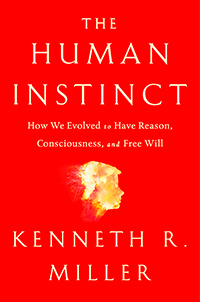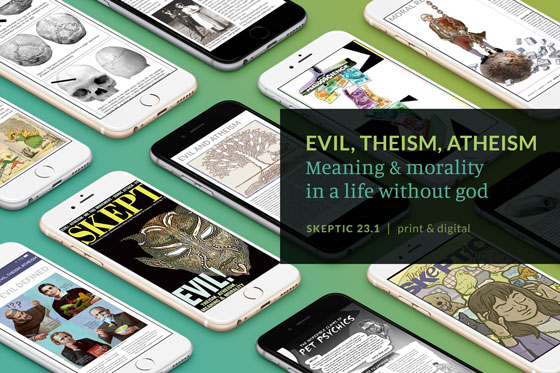In this week’s eSkeptic:
- Science Salon # 23: Dr. Kenneth R. Miller — The Human Instinct: How We Evolved to Have Reason, Consciousness, and Free Will
- Skeptic “Aha!” Moments: Hear JPL Engineer Tracy Drain’s Story
- Distinguished Science Lecture Flashback: Your Unconscious Rules Your Behavior
- Not in Your Stars: A review of Horoscopes: Reality or Trickery? (for kids 9–13)
SCIENCE SALON # 23 (Saturday, instead of Sunday)
Dr. Kenneth R. Miller — The Human Instinct: How We Evolved to Have Reason, Consciousness, and Free Will
Ken Miller is well known for his work in debunking Intelligent Design Creationism, most notably for his testimony in the Dover Pennsylvania trial that demolished the legal strategies of the movement to have creationism taught in public school science classes. His book, Only a Theory: Evolution and the Battle for America’s Soul recounts his experiences and argues why evolution is true.
Now, in his new book, Dr. Miller presents a radical, optimistic exploration of how humans evolved to develop reason, consciousness, and free will, contra scientists such as Richard Dawkins and Sam Harris who tell us that our most intimate actions, thoughts, and values are mere byproducts of thousands of generations of mindless adaptation. We are just one species among multitudes, and therefore no more significant than any other living creature.
Brown University biology professor Miller contends that this view betrays a gross misunderstanding of evolution. Natural selection surely explains how our bodies and brains were shaped, but Miller argues that it’s not a social or cultural theory of everything. In The Human Instinct, he rejects the idea that our biological heritage means that human thought, action, and imagination are pre-determined, describing instead the trajectory that ultimately gave us reason, consciousness and free will. A proper understanding of evolution, he says, reveals humankind in its glorious uniqueness—one foot planted firmly among all of the creatures we’ve evolved alongside, and the other in the special place of self-awareness and understanding that we alone occupy in the universe.
Order The Human Instinct from Amazon. Read the Kirkus review. Read the Publisher’s Weekly review.
Reserve your seat(s) online or by calling 1-626-794-3119. Online reservation closes Saturday, May 19, 2018 at 11am PT. If you purchase your ticket(s) online, you will receive a link by email to download your ticket and map to the venue.
Check Us Out On YouTube.
Science Salons • Michael Shermer
Skeptic Presents • All Videos
Show Your Support
Subscribe to our YouTube Channel and get notified instantly when we post new content! Do you like what you see? Show your support for our work. Your ongoing patronage is vital to our organization’s mission.
SKEPTIC “AHA!” MOMENTS
Hear Tracy Drain’s Story
Tracy Drain is a Flight Systems Engineer at the Jet Propulsion Laboratory in Pasadena, CA. In her 15 years at JPL, she has participated in the development and operation of the Mars Reconnaissance Orbiter (now in orbit at Mars), Kepler (a mission that searched for new Exoplanets in our galaxy), and Juno (which arrived in July 2016). In parallel with her ongoing work on Juno operations, she is currently the Technical Group Supervisor for the Flight Systems Engineering Group, providing guidance and oversight to other engineers who support a variety of JPL missions.
This video was part of a series promoting science, reason, and critical thinking during the Skeptics Society’s 25th Anniversary celebrations.
Become a Patron
You play a vital part in our commitment to promote science and reason. Your ongoing patronage will help ensure that sound scientific viewpoints are heard around the world.
FLASHBACK SCIENCE LECTURE
Dr. Leonard Mlodinow — Subliminal: How Your Unconscious Mind Rules Your Behavior
This lecture was recorded on April 29, 2012 — the last in a series of over 350 Distinguished Science Lectures presented by the Skeptics Society since 1992.
About this lecture
From the best-selling author of The Drunkard’s Walk and coauthor of The Grand Design (with Stephen Hawking) and War of the Worldviews (with Deepak Chopra) comes a fascinating, illuminating examination of the profound ways in which the unconscious mind shapes our lives. Every aspect of our mental lives plays out in two versions: one conscious, which we are constantly aware of, and the other unconscious, which remains hidden from us. Over the past two decades researchers have developed remarkable new tools for probing the unconscious, or subliminal, workings of the mind. This explosion of research has led to a sea change in our understanding of how the mind affects the way we live. As a result, scientists are becoming increasingly convinced that how we experience the world — our perception, behavior, memory, and social judgment — is largely driven by the mind’s subliminal processes and not by the conscious ones, as we have long believed.
Learn more about the Distinguished Science Lectures Series. Watch past Distinguished Science Lectures. Learn about Science Salon — our new series of conversations between Dr. Michael Shermer and leading scientists, scholars, and thinkers, about the most important issues of our time. Watch past Science Salons.
Become a Patron
You play a vital part in our commitment to promote science and reason. Your ongoing patronage will help ensure that sound scientific viewpoints are heard around the world.

In this week’s eSkeptic, Harriet Hall, M.D. (aka the SkepDoc) reviews Horoscopes: Reality or Trickery? by Kimberly Blaker (Green Grove Press. 2018. 78 pages.), a delightful new book for children age 9–13 that encourages readers to ask questions and gives them the tools to find the answers for themselves.
Not in Your Stars
Astronomy is science; astrology is superstition, mythology, and pseudoscience. Depending on how surveys ask the question, anywhere from 22 percent to 73 percent of people believe astrology is valid. Horoscopes still appear regularly in newspapers. Over 90 percent of adults know their zodiac sign. It never occurs to some people to question whether horoscopes are valid, and if they do think to ask the question, they may not have the necessary critical thinking skills to find the answer.
Kimberly Blaker has written a delightful new book, Horoscopes: Reality or Trickery?, that encourages readers to ask those questions and gives them the tools to find the answers for themselves. It is aimed at children age 9-13 but is also suitable for adults. It is short, entertaining, easy to read, and is illustrated with cartoons. She begins with her own horoscope and shows how the description seemed to fit her perfectly. Then she asks if there is a scientific explanation for why it seemed so true.
She covers the 5000-year history of astrology, how it was originally used as a guide for when to plant crops and as a source of omens to guide the state, and how zodiac signs and horoscopes were a later development. She goes over the evidence for astrology and shows how it is flawed, based on unreliable testimonials and flawed reasoning. She says, “Scientific studies make it possible to examine a claim and determine its validity.” And then she goes over all the scientific studies that have shown no correlation between astrological bodies and personalities or life events. She points out that the position of the Sun shifts over time and is now off by one whole zodiac sign, and astrologers have not made any adjustments. […]














